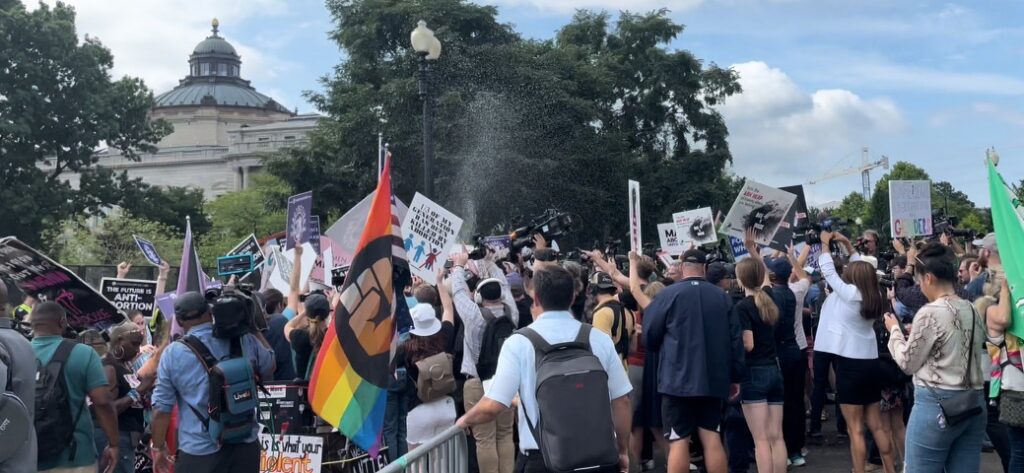I was outside the Supreme Court the moment Roe v. Wade was overturned. I’ve been sick to my stomach since.
I have nothing to add to the conversation around Roe v. Wade that hasn’t been said more eloquently by someone more qualified. Here are the facts: abortion is now banned, severely limited, and/or criminalized in 22 states. In those states, only safe abortion has been abolished, and in those states, women will die, disproportionately women of color and those below the poverty line. Women will be imprisoned for miscarriages and put on trial for deeply personal, private, and devastating moments of their life. This we know is coming.
I have lived in the DC Beltway through controversial elections, devastating mass shootings, joyful highs of progress, and gut-wrenching lows of seeing it rescinded. When a major news story breaks, people flock to the District to celebrate or grieve together. When I’m home, my reflexive response to massive news is to go process it in DC.

On Friday morning, the day we knew the decision overturning Roe would be released, one of my closest friends and I went to the Supreme Court.
I don’t know what I thought we’d walk in to. I wasn’t prepared for a celebration.
There were pro-choice protestors, wearing green and taking turns pleading through desperate tears, telling their own traumatizing and violent stories to reiterate abortion’s necessity both as a medical procedure and a viable option to anyone able to get pregnant, because pregnancy is nuanced, people are nuanced, and life is complex and heartbreaking already.
The majority of the people on First Street were in abject joy. They held signs depicting gravestones reading “Roe, 1973—2022.” The first chants we could hear were gleefully calling for its head. Many, many young women made up the anti-abortion crowd, some of them women of color. Capitol hill interns (“Hillterns”) flocked in from the next-door Capitol building in awkward suit jackets, visibly trying not to gravitate toward the side they agree with. The media presence was, for once, stronger than police presence (at first). Cameras and reporters swarmed young women jumping up and down in joy and on their knees weeping hopelessly.
At 10:11 AM, the Dobbs v. Jackson Women’s Health Organization decision was released, and Roe v. Wade was gone. Cheers erupted like a time bomb. Someone popped champagne over the crowd. Those 100 feet away wearing green wasted no time before calling out, “Illegitimate!”
Time was a blur from there. People cried, people rejoiced and gloated. The song “Fuck You” by Lily Allen was blared over the anti-abortion protest’s speakers on repeat (a song whose singer would reprise it with Olivia Rodrigo at the Glastonbury music festival Saturday night, in dedication to the five justices who overturned Roe).
What I couldn’t stop thinking about in that moment was the numerous moments in my 19 years when a woman I love has called me to tell me she’s been sexually assaulted. In that moment, there’s nothing to do but cry with them and sit there in those intense, visceral, indescribable feelings, most poignantly, devastation that nothing you can say or do will help. I’ve helped friends make contingency plans in those scenarios, if, god forbid, they ended up pregnant.
I can’t stop thinking about those phone calls, and what state they came from, and if that state would no longer support her in seeking an abortion in the worst-case scenario. I can’t stop remembering the sound of them weeping in devastation over the phone, feeling helpless and worlds away from them.
My heart was and remains shattered beyond my wildest belief.
JJ Lansing is a Media Studies student at the University of San Francisco.







